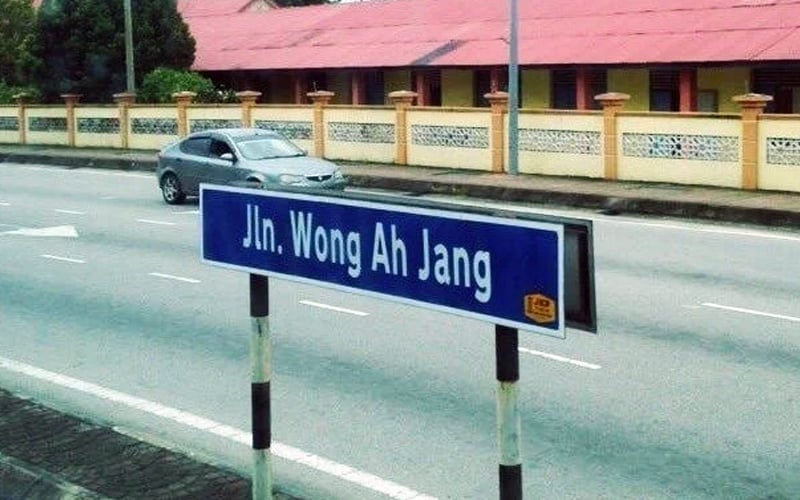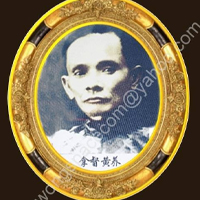FMT:
Renaming of Kuantan’s Jalan Wong Ah Jang draws public ire
The city council’s decision has sparked protests from a city executive councillor and the community.

Wong Ah Jang, who relocated from China to Kuantan at age 15, was a prominent businessman in the 1920s. (Facebook pic)
PETALING JAYA: A decision to rename several streets in Kuantan bearing the name of historical figure and prominent businessman Wong Ah Jang has drawn the ire of multiple quarters.
Recently, mayor Razihan Adzharuddin said that following a government resolution, the series of streets named Jalan Wong Ah Jang 1 to 5 will be renamed Jalan Bunga Kemboja 1 to 5.
The name change process was scheduled to take place throughout the month of September, with road signs and lane markings to be updated.
Teruntum assemblyman and state executive councillor Sim Chon Siang said he planned to contest the decision at the upcoming exco meeting, as he was not informed about the change.
“They (Kuantan City Council) said that renaming the streets in the area was necessary for its growth. However, I believe that growth is possible even without a name change,” Sim told FMT.
Sim said he hopes to advise Pahang menteri besar Wan Rosdy Wan Ismail against changing the names of the roads.
PETALING JAYA: A decision to rename several streets in Kuantan bearing the name of historical figure and prominent businessman Wong Ah Jang has drawn the ire of multiple quarters.
Recently, mayor Razihan Adzharuddin said that following a government resolution, the series of streets named Jalan Wong Ah Jang 1 to 5 will be renamed Jalan Bunga Kemboja 1 to 5.
The name change process was scheduled to take place throughout the month of September, with road signs and lane markings to be updated.
Teruntum assemblyman and state executive councillor Sim Chon Siang said he planned to contest the decision at the upcoming exco meeting, as he was not informed about the change.
“They (Kuantan City Council) said that renaming the streets in the area was necessary for its growth. However, I believe that growth is possible even without a name change,” Sim told FMT.
Sim said he hopes to advise Pahang menteri besar Wan Rosdy Wan Ismail against changing the names of the roads.

Wong Ah Jang.
Wong, who relocated from China to Kuantan aged 15, was a prominent businessman in the 1920s. He initially worked in an iron mine before capitalising on the booming rubber industry as the region’s first licensed rubber wholesaler.
He also initiated Kuantan’s first motorised public transport service and actively participated in community development. Being a successful businessman, he was recognised with several awards for his significant contribution to the region.
Wong also invested in real estate, including a modern residence along Sungai Kuantan and a well-preserved building on Jalan Teluk Sisek. He died in 1929, leaving a legacy of innovation and community service.
Recently, an online petition was initiated to oppose the roads’ renaming, highlighting the need to preserve history and its potential economic impact.
The signatories urged Wan Rosdy and the state government to reevaluate the decision, emphasising the value of maintaining the historical names of the state’s streets.
In a comment left under the petition, one Kai Lit Phua pleaded with the Pahang government to not erase the memory of an important figure in Kuantan and Pahang’s history.
“Instead, retain the name of the road and consider establishing a Kuantan history museum,” said Kai.
Another petitioner, Phua Kin Keng, recounted his deep familial and historical ties to the Kuantan region, spotlighting the significant connection between the name and the area’s rich history.
“The late Wong Ah Jang, together with my late grandfather and numerous other distinguished individuals from Kuantan, were steadfast supporters of Sultan Abdullah Al-Mu’tasim Billah, playing significant roles in the growth and development of Kuantan.
“Renaming the road threatens to eliminate over seven decades of historical narrative connecting Kuantan’s early developmental phases to its contemporary status as a city,” said Phua.
Meanwhile, MCA vice-president Ti Lian Ker criticised Sim for not adequately performing his obligations both as a state assemblyman and an exco member.
Ti accused Sim of avoiding accountability and pointing fingers at others instead.
“Normally, if officers respect an assemblyman, they inform him before executing such decisions. Sim hasn’t met his duties, which is clear from his inability to engage in a dialogue with the mayor regarding this issue,” said Ti.
Wong, who relocated from China to Kuantan aged 15, was a prominent businessman in the 1920s. He initially worked in an iron mine before capitalising on the booming rubber industry as the region’s first licensed rubber wholesaler.
He also initiated Kuantan’s first motorised public transport service and actively participated in community development. Being a successful businessman, he was recognised with several awards for his significant contribution to the region.
Wong also invested in real estate, including a modern residence along Sungai Kuantan and a well-preserved building on Jalan Teluk Sisek. He died in 1929, leaving a legacy of innovation and community service.
Recently, an online petition was initiated to oppose the roads’ renaming, highlighting the need to preserve history and its potential economic impact.
The signatories urged Wan Rosdy and the state government to reevaluate the decision, emphasising the value of maintaining the historical names of the state’s streets.
In a comment left under the petition, one Kai Lit Phua pleaded with the Pahang government to not erase the memory of an important figure in Kuantan and Pahang’s history.
“Instead, retain the name of the road and consider establishing a Kuantan history museum,” said Kai.
Another petitioner, Phua Kin Keng, recounted his deep familial and historical ties to the Kuantan region, spotlighting the significant connection between the name and the area’s rich history.
“The late Wong Ah Jang, together with my late grandfather and numerous other distinguished individuals from Kuantan, were steadfast supporters of Sultan Abdullah Al-Mu’tasim Billah, playing significant roles in the growth and development of Kuantan.
“Renaming the road threatens to eliminate over seven decades of historical narrative connecting Kuantan’s early developmental phases to its contemporary status as a city,” said Phua.
Meanwhile, MCA vice-president Ti Lian Ker criticised Sim for not adequately performing his obligations both as a state assemblyman and an exco member.
Ti accused Sim of avoiding accountability and pointing fingers at others instead.
“Normally, if officers respect an assemblyman, they inform him before executing such decisions. Sim hasn’t met his duties, which is clear from his inability to engage in a dialogue with the mayor regarding this issue,” said Ti.
***
kt comments:
De-Sinicization process has begun.
No comments:
Post a Comment